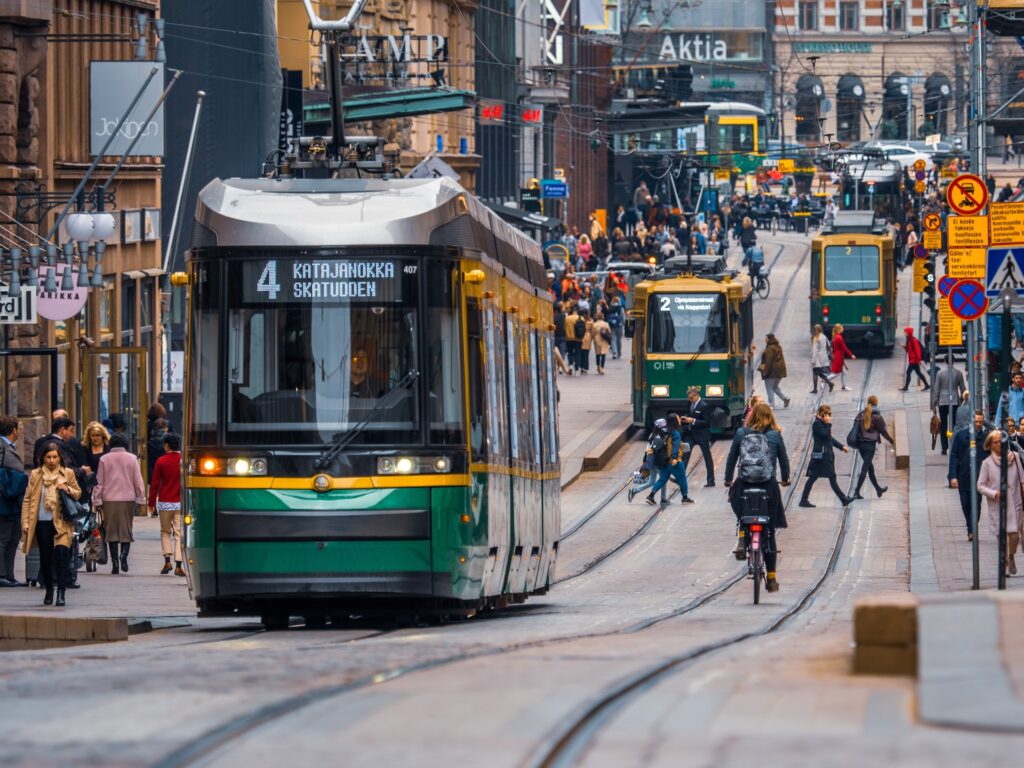The social and economic structure of Finland is based on the Nordic model of a welfare state. This means that the residents of Finland can expect universal and high-quality social security and a wide range of public services, including high-level and comprehensive healthcare, as well as free education. Finland is also known for its well-developed road and public transportation network, high-quality communications, and well-planned infrastructure for business development.

Photo by Tapio Haaja on Unsplash
Despite its small population of around six million people, Finland stands out among other European countries for its social efficiency, equality, quality education, environmental consciousness, and the well-being of children. Additionally, Finland is one of the safest countries in the world, with low crime rates, an effective law enforcement system, and a high level of public safety. The security of Finland is ensured through a well-functioning social security system, a high quality of life, and the primacy of law.
Finland is:
- The most stable country in the world (The Fund for Peace, Fragile States Index 2022)
- The happiest country in the world (World Happiness Report 2018–2023)
- One of the three least corrupt countries in the world
Moreover, Finland is among the top 10 leaders in economic development based on key technological indicators (World Economic Forum – 2022), as well as in the top 10 most innovative countries in the world (The Global Innovation Index – 2022).
EXCELLENT WORK-LIFE BALANCE
Finland is a country of equal opportunities. It ranks high in the Gender Equality Index (World Economic Forum, Global Gender Gap Index 2020) and the Child Equality Index (UNICEF, Fairness for Children: A league table of inequality in child wellbeing in rich countries).
Finns value the balance between work and personal life and prioritize spending time with family and friends. The work-life balance is supported by long vacations and reasonable working hours. At the same time, high productivity, professionalism, efficient work organization, and a high level of responsibility contribute to achieving excellent economic results. In 2019, Helsinki was recognized as the best city in the world for living in terms of work-life balance (Kisi, The 2019 Work-Life Balance Index).
Additional information: https://www.infofinland.fi/en/work-and-enterprise/finnish-working-culture
HIGH-QUALITY SOCIAL SERVICES
Medical services in the public sector are funded through municipal taxes, so all permanent residents of Finland have the right to access public healthcare services. Anyone covered by the Finnish social security system also receives reimbursement for expenses when using private medical clinics. Additional insurance can be purchased from various insurance companies at a reasonable cost, providing the right to access private clinics at a lower price. Additionally, many employers offer their employees additional medical insurance.
All doctors working in both the public and private sectors in Finland have a university education, ensuring a high quality of services.
Additional information: https://www.infofinland.fi/en/health/health-services-in-finland
The Finnish social security system provides financial assistance to individuals and families from birth to old age in various life situations. This includes benefits related to healthcare and unemployment, as well as several types of family benefits, such as child benefits, home care allowances, private care allowances, and pregnancy and childbirth allowances.
For many years, Finland has been a leader in the Program for International Student Assessment (PISA) conducted by the OECD. Finland is well-known for its education system, which has become a benchmark for the world. Key features of Finnish education include its accessibility (including the opportunity for education in foreign languages), the constant implementation of innovative teaching methods, and consistently high-quality educational programs. Public education is free for all residents of Finland at all levels, from preschool to university. Daycare centers are subsidized by the government and are affordable.
GREAT ECOLOGY AND SUSTAINABILITY
Finland is one of the leading countries in the field of ecology and sustainable development. The country actively works towards preserving its natural resources and minimizing negative impacts on the environment.
Finland has extensive forest resources and is one of the most forested countries in Europe. Over 70% of Finland’s territory is covered by forests, which play a crucial role in absorbing carbon dioxide and maintaining ecological balance. The country actively practices forest management, including sustainable tree harvesting and biodiversity conservation.
Finland actively participates in the fight against climate change. The country aims to reduce greenhouse gas emissions and transition to clean energy sources. Finland is actively developing renewable energy sources such as wind power, solar energy, and biomass utilization. Additionally, Finland has set an ambitious goal to become carbon-neutral by 2035.
Finland places great importance on environmental awareness and education among its population. Various programs and initiatives are implemented in the country to raise awareness about environmental issues, promote resource efficiency, and reduce consumption. Finland also has a well-established system of environmental certification and labeling for goods, which helps consumers make informed environmental choices.
Overall, Finland is a shining example of a country where environmental issues and sustainable development hold a significant place in everyday life and national strategy. The country strives to preserve its natural beauty and create a clean living environment for future generations.

Photo by Saad Chaudhry on Unsplash
COST OF LIVING
The average monthly salary in Finland currently stands at 3,300 euros before taxes. Finland operates with a progressive taxation system, which means that the tax percentage increases with income. A tax calculator to determine the tax percentage can be found on the Finnish Tax Administration website. Taxes are used, among other things, to finance a wide range of public services provided by Finnish society.
The cost of housing plays a significant role in overall expenses, particularly in Helsinki and the capital region. Heating and water are often included in the rent, but internet and electricity need to be paid separately. However, both electricity and internet in Finland are relatively affordable compared to much of Western and Central Europe.
Finland has a reputation for being a somewhat expensive country, but in reality, it is the most affordable option in the Scandinavian region. Additionally, the cost of living varies depending on the region. The actual cost of living depends on various factors, including lifestyle and location, and with reasonable financial planning and a decent salary, it is possible to live comfortably even on a limited budget. The minimum funds required by the Finnish Emigration Service to obtain a student residence permit are 560 euros per month, while the financial requirements for relocating as a startup entrepreneur amount to a minimum of 1,000 euros per month.
Leave a Reply
You must be logged in to post a comment.